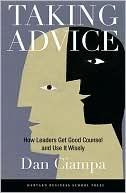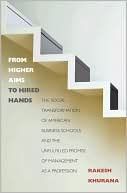Executive Action
Urgent Information for
Executive Decision Making
October 31, 2008
Number 2
|
|
Note to Readers
Welcome to the second electronic issue of Executive Action. After this, we'll stop counting them, but you'll note that this issue is dated for October 31, 2008. This is a small indication that the publication will be somewhat irregular in its timing so as to bring you the most important concepts I'm working on. My goal is to avoid burdening you with yet another daily or weekly periodical to read and absorb. I want to this eNewsletter to be right on in terms of its importance to you, from the moment you open it. New feature in this issue: Three current articles or newsletters of interest, across a broad spectrum of management concerns and ideas. I hope you'll read them critically and, where you have a disagreement or challenge, send it our way so we can explain ourselves and learn more together. New feature in this issue: Three critical business book recommendations trusted advisors and leaders should be reading. New feature in this issue: Crisis Guru, specific answers to questions I have been asked in person or by e-mail. This issue features the answers to two important questions: How Can I Convince My Boss to Focus on Crisis Planning? and How Do I Correct the Record When the Media Get It Wrong? Past eNewsletters are archived for you here. We hope to bring you podcasts in the next issue, or the issue following that. Our initial podcasts will be the business stories I use to teach important leadership lessons. As always, your comments, questions, suggestions, and debate are welcome.As always, your comments, questions, and suggestions are welcome.

James E. Lukaszewski, ABC, APR, Fellow PRSA, CCEPjel@e911.com |
|
s
Lukaszewski's Contention Survival Manifesto
This manifesto is a personal and often publicly declared set of principles, policies, or intentions for addressing contentious public circumstances and situations, and behaving with integrity, honesty, and even good humor. If your mother could teach you the rules for winning in the irritating, aggravating, agitating environment of being under attack in the news media, personally, politically, or professionally, these techniques and practices are what she (or most moms) would teach. You can succeed even in the face of contentious people, angry neighbors, negative media coverage, and irritated public officials.
- Speak only for yourself. Say less, write less, but make these communications truly important.
- Answer every question. Honorable organizations, people, programs, and initiatives can answer any question. Aim for 75-150 word responses. This is 30-60 seconds reading or speaking time.
Click here to read more of Lukaszewski's Contention Survival Manifesto.
|
|
t
The Politics of Employee Communications
Building Community Consent
For an organization to succeed each day, at least 51 percent of those who matter have to be pulling in the same direction. That requires leadership from the top, every day, to point the way and to help forecast and overcome the new barriers that arise and the old barriers that persist. This is a tall order in many organizations. Some leaders are good communicators, some are non-communicators. Some leaders are good delegators, some are autocrats. Some leaders are bureaucrats, some are activists, and some are charismatic. The reality is that organizations will be successful in the context of their current leaders and leadership. Click here to read more about The Politics of Employee Communications. |
|
f
Mastering the Art of Giving Advice
Do you want to have influence? Most people would say, "Of course!" Having influence means being remembered, and being asked in on decisions and strategy well before the strategies are selected and the decisions need to be made. Those with influence make an impact on their organizations and the larger world, and advance more rapidly in their careers.
Here's a test of your current level of influence within your organization. Do people hold up meetings, waiting for you to arrive to make important contributions or interpretations of current events? Do people remember what you say and perhaps quote you in other places and venues? Do people tell your stories and share your lessons as though those stories belong to them? Do people learn things from you that they acknowledge to you and remark about to others? Do others seek out your opinion and ideas, or share their agendas and beliefs with you in the hope of influencing you to influence the behavior of others more senior than you?
Click here to read more about the giving advice.
|
|
Jim's Suggested List of Management Reading
|
 Ahead of the Curve: Ahead of the Curve:
Two Years at Harvard Business  School By Philip Delves Broughton
Penguin Press HC, The (July 31, 2008)
A fascinating book by Broughton, who left a long and distinguished career as a British journalist and who, at age 32, enrolled at Harvard Business School. It is a place he refers to as "a factory for unhappy people." All in all, this book (rather than being a tell-all or tattletale) is a discussion of what goes on at the world's premier business school, from the vantage point of a knowledgeable observer and journalist who, among other things, can actually add, subtract, multiple, and divide (and do even more serious mathematical calculations).
Broughton gives a useful narrative of the rituals, the mythology, some of the delusions, and a fair amount of shallowness as a part of his matriculation through Harvard Business School.
Having had a son who recently finished his Masters in Business Administration at Oxford, in England, some of the stories my son talks about and some of his newfound wisdom tends to validate Broughton's account. Again, this is a fascinating and important read in a world where we are seeing M.B.A.s injected into the business environment, at all levels, by the thousands every year.
|
 Taking Advice: How Leaders Get Good Counsel and  Use It Wisely Use It Wisely
By Dan Ciampa
Harvard Business School Press
(September 30, 2006)
This is the only book I'm aware of that provides extraordinarily insightful guidance for top executives about choosing those who counsel them, teaching those counsel them what their most important needs are, and helping those who counsel them teach them how the advice they get should be absorbed, evaluated, and implemented. Dan Ciampa is a well known, long-time counselor to a large number of important CEOs and other senior organizational leaders.
For those who serve as trusted advisors, this book is the gateway into an entirely new area of thinking and understanding in one of the most crucial areas of need senior managers have: namely the selection of those other voices, sometimes a lot of them, to share opinions, ideas, suggestions, options, and wisdom as senior executives struggle to make important decisions about tomorrow for their organizations.
|
 From Higher Aims to Hired Hands: From Higher Aims to Hired Hands:
The Social Transformation of American Business Schools and the Unfulfilled Promise of Management as a Profession
By Rakesh Khurana
Princeton University Press
(September 17, 2007)
In this "529-page meticulously researched and intellectually analyzed chronicle of the 125 year evolution of university-based business schools," according to business guru, John Budd, "Professor Khuran suggestively spreads clues that indicate that the current state of chief executives may be the unintended consequence of American business schools' struggle for an answer on how to establish management as a legitimate occupation." The book also talks about the failure of these schools to teach, or care much about the integrity of senior leadership. It explores the seeds of the behaviors, beliefs, and decisions that stand out in the public's mind about today's business leaders-maximizing shareholder value, stock option foolishness, hedge funds, private equity activities, and money, money, money, money.
This book has stories and lessons for every trusted advisor and senior executive counselor. We are entering a period of economic turmoil so intense and corrosive that the very nature of management may be redefined as public confidence in how businesses are run, and who runs them, plummets as public and government anger and irritation rises.
| |